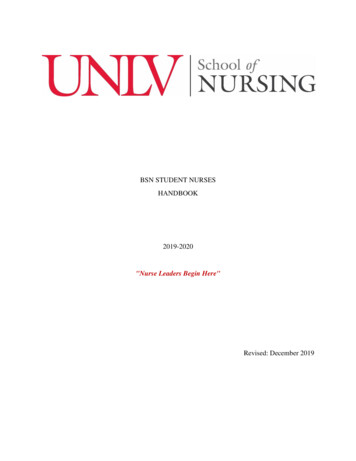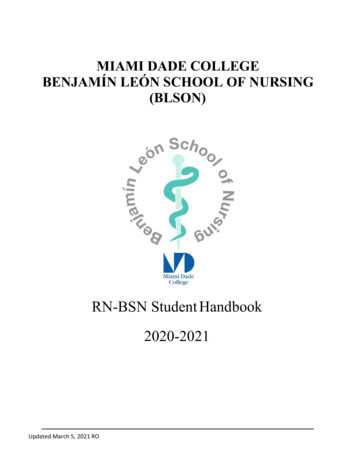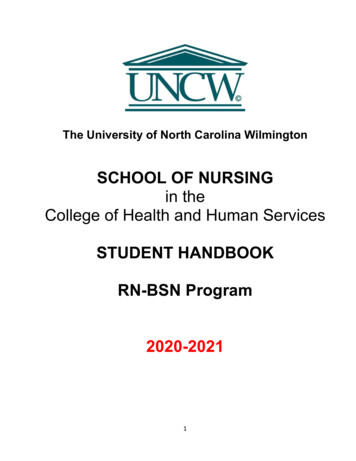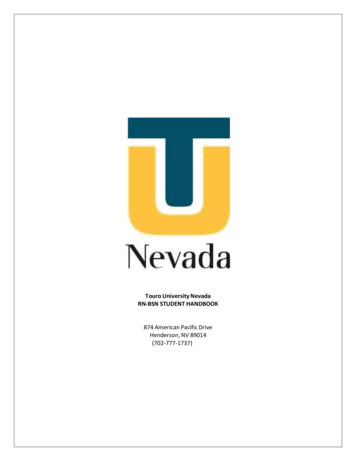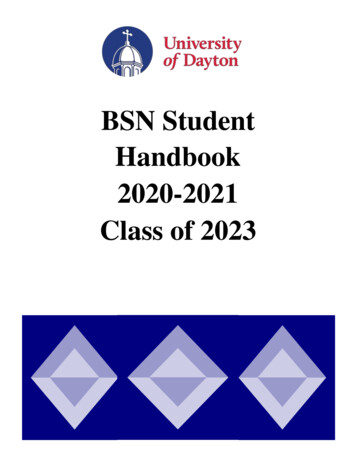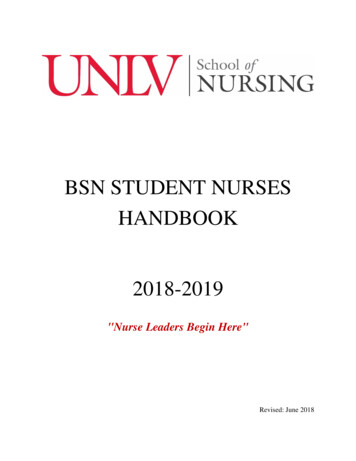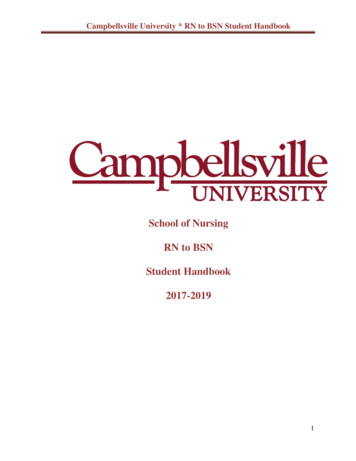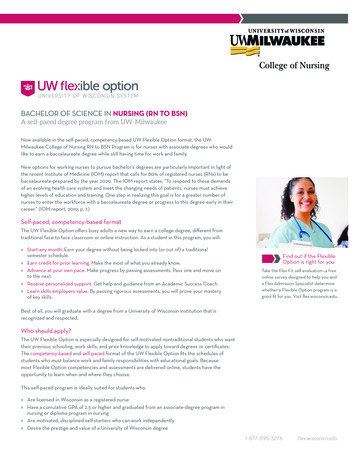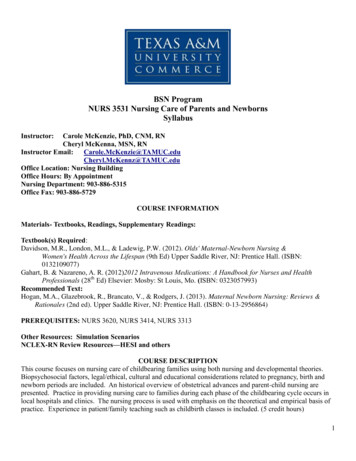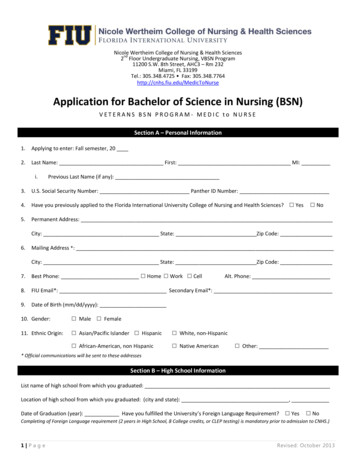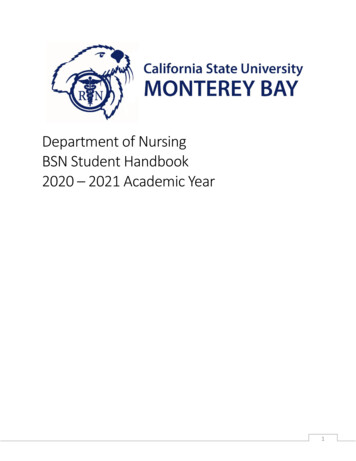
Transcription
Department of NursingBSN Student Handbook2020 – 2021 Academic Year1
Chair’s Welcome LetterDear Students,The faculty and staff of the Department of Nursing at California State University, MontereyBay are pleased to welcome you to the BSN program. The steps you have taken and theacademic work you have completed as prerequisite to admission provide an excellentbackground for the work that lies ahead.You are continuing towards a challenging and rewarding profession whose members areneeded now more than ever before, to make a difference in the health status of ourpopulation by expanding the knowledge development into community health/public andglobal health.This is the time to fully invest in your education; to grow and learn in new ways. Thenursing faculty encourages students to think outside of the box and stretch beyond theircomfort zones. In every class, faculty support students to: Read critically Write cogently Think broadly Challenge assumptionsWelcome to the BSN program. We are happy you’re here. Best wishes to all of you as youexpand your professional nursing career. Please feel free to reach out to me anytime.Sincerely,Alyssa Erikson, RN, PhDAssociate ProfessorDepartment Chairaerikson@csumb.edu831-582-51802
ContentsChair’s Welcome Letter . 2Section 1: General Information . 6History of CSUMB Department of Nursing . 6CSUMB Foundation Vision Statement, Mission and Strategic Plan. 6Nursing Program Mission and Vision . 6Nursing Program Philosophy . 7Learning Outcomes. 7Undergraduate Learning Outcomes (ULOs) . 7Major Learning Outcomes (MLOs) . 8Nursing Program Goals . 8Licensing, Certification and Employment Opportunities of our BSN Graduates. 9Admission Requirements . 9Curriculum. 10CSUMB Catalog. 11Section II: Academic Policies . 12Program Policies . 12Academic and Clinical Standards . 12Academic Integrity/Plagiarism . 12Academic Writing . 12Course Syllabus Policy. 12Graduation and Grading Standards . 12Holiday Scheduling of Classes . 12Leave of Absence . 13Community Health Clinical Policies and Information . 13Health Requirements . 13Clinical-related Policies . 15Section III: Student Information . 17Nursing Program Resources . 17Administration & Staff . 17Extended Education & International Programs (EEIP) . 173
Class Representatives . 17Course Registration . 17Current Contact Information . 18Student Grievance . 18Nursing Program Student Grievance Procedure . 18Student Grade Appeal . 18Student Evaluations . 19Course and Instructor Evaluation . 19BSN Agency and Preceptor Evaluation Survey . 19BSN Exit Survey . 19Student Graduation Instructions . 19Advisement . 19Graduation Instructions . 19Public Health Certificate . 19Section IV: University Policies and Resources. 20University Policies. 20University Resources . 20Basic Needs . 20Bookstore . 21Campus Services Center (CSC). 21Center for Academic Technologies (CAT). 21Cooperative Learning Center (CLC) . 21Email Communication . 22Financial Aid . 22Information Technology. 23Library . 23Personal Growth & Counseling Center . 23Office of Inclusive Excellence . 24Otter Cross-Cultural Center (OC3) . 24Service-Learning . 25Student Disability Resources (SDR). 25Student Health Services . 26Student Veteran’s Services . 264
Test Center . 26Transfer Student Success Center . 26Zoom . 26Appendices. 27Appendix 1: Reportable Patient/Client Clinical Occurrence Involving a Nursing Student Policy andProcedure. 27Appendix 2: Missed Clinical Hours Policy . 28Appendix 3: Readmission and Progression Policies . 29Appendix 4: Dress and Behavior Code Guidelines for the Clinical Agencies . 30Appendix 5: Student Health or Safety Clinical Incident Policy and Procedure . 31Appendix 6: Student Grievance Form . 335
Section 1: General InformationHistory of CSUMB Department of NursingCalifornia State University, Monterey Bay (CSUMB) is located on the military site of thedecommissioned US Army Base, Ft. Ord, in Monterey, California. CSUMB is one of theyoungest California state funded universities that opened its doors for student enrollment inAugust 1995. The campus is comprised of 1365 acres near the beautiful Monterey Baycoastline. The CSUMB is designated as a Hispanic Serving Institution with 44% of itsstudent body identifying themselves as Latino, with 53% being first-generation collegestudents. Language proficiency requirement and service learning are two pillars of CSUMBeducation that speak to higher education, and deepening the connectedness to communityneeds. In 2013, CSUMB received the Higher Education Civic Engagement Award and waselected to the Carnegie Community Engagement Classification when the designation wasestablished in 2006. The nursing program at CSUMB reflects the university’s mission oncommunity engagement by designing the service-learning objectives into the communityhealth theory and clinical course content, while working closely with community partnersidentified by Service-Learning Institute and those unique for nursing public/communityhealth needs. The BSN program began in 2012 as an ADN-BSN program and hassuccessfully partnered with the surrounding community colleges and community healthcarepartners to support the BSN professionals within this Tri-county community of Monterey,San Benito, and Santa Cruz and has a collaborative program with Cuesta College in San LuisObispo county. This BSN program also allows a smooth transition for registered nurses whoare currently employed in the community or have just graduated and are keen to earn theBSN degree while seeking employment. Our faculty and staff support student successthrough teamwork, collegiality and leadership that embraces growth in the discipline andhighlight this by the development of global nursing program and community service.CSUMB Foundation Vision Statement, Mission and Strategic PlanCSUMB Vision Statement: https://csumb.edu/about/vision-statementCSUMB Mission and Strategic Plan: ing Program Mission and VisionMission: The CSUMB Department of Nursing is a community focused, student-centeredprogram whose mission is to educate nurses for professional practice in diverse healthcaresettings that is influenced by global health.Vision: To educate nurse professionals to be change agents in the science of nursing.6
Nursing Program PhilosophyThe faculty in the Department of Nursing at the CSUMB view that the Bachelor of Sciencein Nursing (BSN) undergraduate education should embody a broad background in thesciences, community service, global health, and liberal arts studies. The nursing disciplinespecific courses are developed to prepare graduates to assess, plan, implement and evaluatecare, based on current evidence in a variety of nursing practice settings and specialties. TheDepartment of Nursing academic programs are deliberately designed in response tosurrounding community needs, larger societal needs including but not limited to the need forgreater access to equitable healthcare, the role of technology and healthcare structuringsystems in healthcare and population health education, surrounding self-care responsibility.The faculty affirms that the professional baccalaureate level graduates are prepared asgeneralists who provide healthcare as clinicians, clinical nurse researchers, patient educators,and leaders in the practice setting.BSN graduates are catalysts or change agents in the community/public health settings wherethey practice as independent and critical thinkers, while advocating for theclient/patient/family and the nursing profession. This ideology supports the mostfundamental philosophy of faculty, that nursing science and art collectively utilizes theprinciples of connectedness of patient/client as individual, family or community. Thisideology supports the vision/mission of the university and the college as well as thecommonly held beliefs of the faculty. These beliefs reflect the faculty’s attitudes about thepersonhood, health and well-being, nursing science, environment and teaching-learning as itimpacts the community. The faculty’s approach to nursing education is that students arefuture nursing professionals and are adult learners with a commitment to continuingeducation who are going to provide healthcare that will improve the health and well-being ofindividuals, families and communities. The faculty collectively support and foster thediversity of students’ backgrounds and their personal beliefs and experiences they bring tonursing inquiry. This philosophy of nursing espouses that making a professional nursingcareer choice may have its challenges, but the faculty are prepared to respect the student’schoice and foster them with integrity, respect for self and others, the need for collegialityand partnerships, teaching/learning skills, social justice, and an awareness of communityneeds.Learning OutcomesUndergraduate Learning Outcomes (ULOs)ULO 1: Intellectual SkillsCSUMB graduates demonstrate competence in critical thinking, written and oralcommunication, information literacy, and quantitative reasoning.ULO 2: Personal, Professional, and Social ResponsibilityCSUMB graduates engage in ethical reasoning and public action that is informed byhistorical, multicultural, global, ecological, and equity-oriented perspectives.ULO 3: Integrative Knowledge7
CSUMB graduates synthesize and connect knowledge, skills and experiences acrossdisciplines, allowing them to address new and complex situations.ULO 4: Specialized KnowledgeCSUMB graduates apply knowledge, theories, methods, and practices in a chosen field ofstudy to address real-world challenges and opportunities.Major Learning Outcomes (MLOs)MLO 1 CommunicationDemonstrate effective communication principles in conducting professional relationships.MLO 2 Population HealthApply community/public health models and theories to promote health and well-being ofdiverse populations across the lifespan.MLO 3 Evidence-based PracticeCritically analyze research findings, theory, and health policies as it applies to nursingpractice.MLO 4 Information LiteracyIntegrate health care technology and data in the assessment and evaluation of quality ofcare, safety, and health status of patients/populations.Nursing Program GoalsGraduates of Bachelor of Science in Nursing will be able to:1. Integrate knowledge, skills and abilities adapted from the liberal arts, humanities,sciences, and social sciences theories of social justice concepts to promote diversity andholistic nursing practice.2. Develop effective leadership and management skills within the standards of nursingpractice to improve patient safety and improve health outcomes for populations across thelifespan.3. Integrate and apply knowledge related to health and wellbeing in a diverse populationrelated to chronic illnesses and disease management while incorporating palliative careand end of life issues using professional communication.4. Integrate theory and evidence from a broad discipline to critically analyze research inscholarly manner that will build nursing knowledge, improve practice and healthoutcomes of diverse populations.5. Demonstrate the utility of healthcare information management and technology to assessand evaluate quality of care and health status of patients.8
6. Analyze healthcare policies, healthcare financing and apply as deemed necessary toinfluence the healthcare system structuring at the organizational level for patientadvocacy of vulnerable populations.7. Articulate how health policies are processed and how it informs the nursing professionand the population.8. Apply effective communication principles and collaboration efforts when negotiatingprofessional relationships with family/clients, and interdisciplinary team through theprinciples of professional behavior, ethics, and manner with patient and professionalrelationships in light of population diversity.9. Demonstrate respect and acknowledgement of the person by providing population basedhealthcare that promotes health and well-being and is deemed morally, ethically andculturally appropriate for diverse individuals across the lifespan.10. Maintain nursing professionalism through continued education in order to addresschanging socio-cultural, economic, healthcare systems and policies,
Nursing Program Mission and Vision Mission: The CSUMB Department of Nursing is a community focused, student-centered program whose mission is to educate nurses for professional practice in diverse healthcare settings that is influenced by global health. Vision: To educate nurse professionals to be change agents in the science of nursing.
